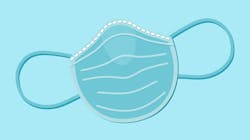Hawaiian Airlines Brings in 1.6 Million Face Masks
A Hawaiian Airlines passenger plane whose 3,920-cubic-foot belly was filled with protective masks for Hawaii’s people has landed.
Credit goes to the vision of a young man and the nonprofit he co-founded, the help and generosity of nearly 100 partner organizations, and the airline.
The Airbus 330 arrived Tuesday afternoon at Daniel K. Inouye International Airport with 1.6 million masks — the bulk of the 2 million ordered by the nonprofit Every1ne Hawaii.
Not a single mask will be sold. Instead they will be distributed across the state free to vulnerable groups, including the homeless, the jobless and low-income families with kids, said Every1ne co-founder Robert Kurisu.
Partner groups, which already work with communities on Oahu, Maui, Molokai, Hawaii island and Kauai, will distribute them starting Saturday in Maili.
The Waianae Coast Comprehensive Center, which is engaged in food distribution, will have 50,000 masks to give out, Kurisu said.
The 2 million-mask mission wasn’t always Every1ne’s mission.
Kurisu said the nonprofit, made up of 25 or so millennial friends, initially formed to get their peers to vote in the presidential election, but then the coronavirus pandemic struck.
“We pivoted to help out our community,” he said.
The goal became getting personal protective equipment for Hawaii’s health care professionals.
But when the nonprofit’s members learned that was outside the realm of possibility since they were competing with states and local governments, they switched gears again.
Darragh O’Carroll, an emergency room physician who attended Punahou School with many in the group, was their point person.
“There are so many asymptomatic carriers, so masks are definitely needed,” he said, adding that initially he didn’t recommend them for the general public.
The group members learned they could obtain nonmedical-grade, 12-hour disposable masks for the general public to use at a greatly reduced cost if they bought in bulk.
“We had to order masks by the million,” said Kurisu, adding that they soon learned that they had to jump through a number of hoops.
Kurisu had turned to Danny Kim of Koha Foods, which imports food and other products from Asia, for help.
In mid-March “we pulled the trigger as early as we could,” Kurisu said.
Kim encountered obstacles he never had before in all the importing he has done from China.
“My agent was dealing in this category, but I just never bought this stuff before,” he said. Getting the best price “depends on how many points of contact you have,” so going straight to the manufacturer was ideal.
They found a manufacturer in Shenzhen, “the Silicon Valley of China,” but negotiating with the manufacturer, trying to get it here as soon as possible and wiring money to people they don’t know well were some challenges, Kim said.
But it was not typical to have to provide letters from the state of Hawaii, from the U.S. Embassy in Guangzhou, which Kim had to talk to in order to get approval, and “Chinese customs in order for them to release the product because it was such a large quantity,” Kim said.
He said if it hadn’t been for Hawaiian Airlines and its cargo people like Brad Matheny, it could have taken much longer.
They began talks with the airline because the group didn’t want to ship by boat, which would mean the masks wouldn’t arrive until May 1 or 2.
The group paid for operational costs, including fuel and landing fees, but the rest, including the crew and the plane, was on Hawaiian.
The money came from family foundations, corporations and others.
Kurisu declined to say how much they paid for the masks or the airline costs.
Hawaiian President and CEO Peter Ingram said, “We flew this flight specifically to pick up this cargo to support Every1ne.”
It required a rest stop in South Korea, then to Shenzhen, then back to South Korea before a flight home.
The passenger plane’s cargo hold was filled to capacity with 1.6 million masks in 800 cases, weighing 19,800 pounds — light for a plane that often carries 50,000 pounds of cargo from the West Coast.
Another 400,000 will be sent by a third-party carrier in two weeks.
Correction: >> Brad Matheny is Hawaiian Airlines managing director of cargo. An earlier version of this story and in the Wednesday print edition gave an incorrect first name.
———
©2020 The Honolulu Star-Advertiser
Visit The Honolulu Star-Advertiser at www.staradvertiser.com
Distributed by Tribune Content Agency, LLC.
